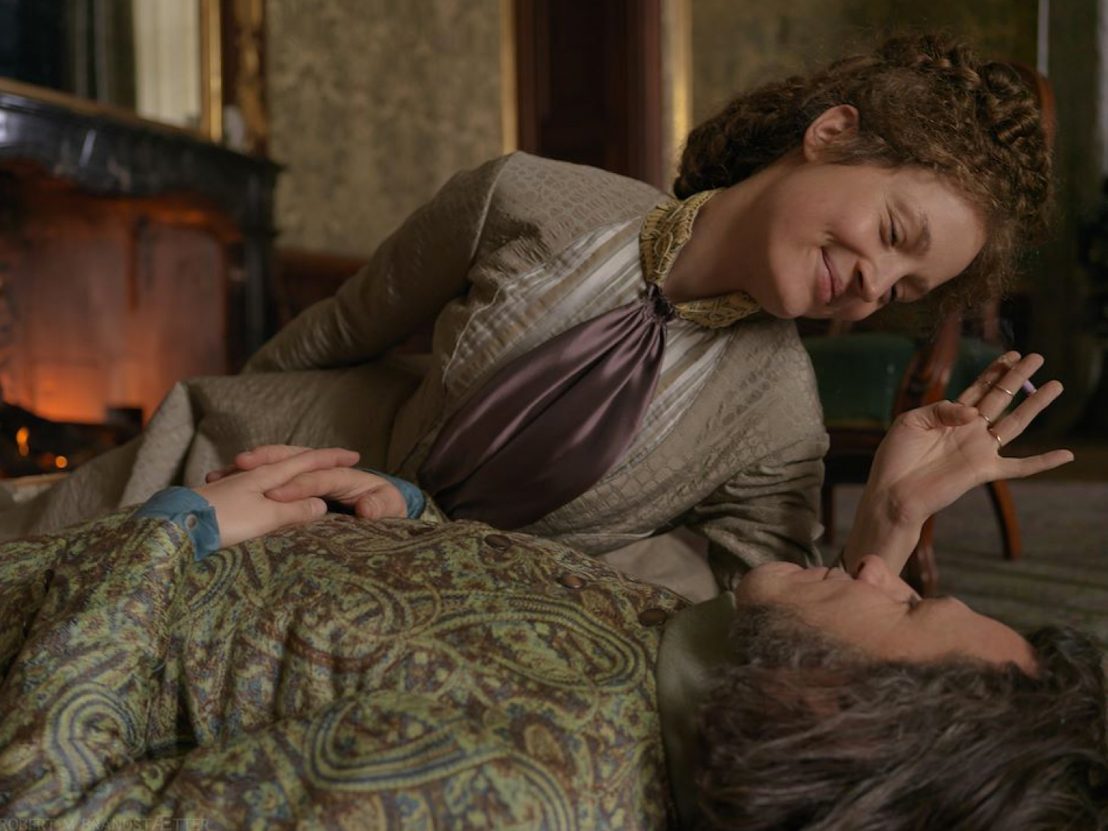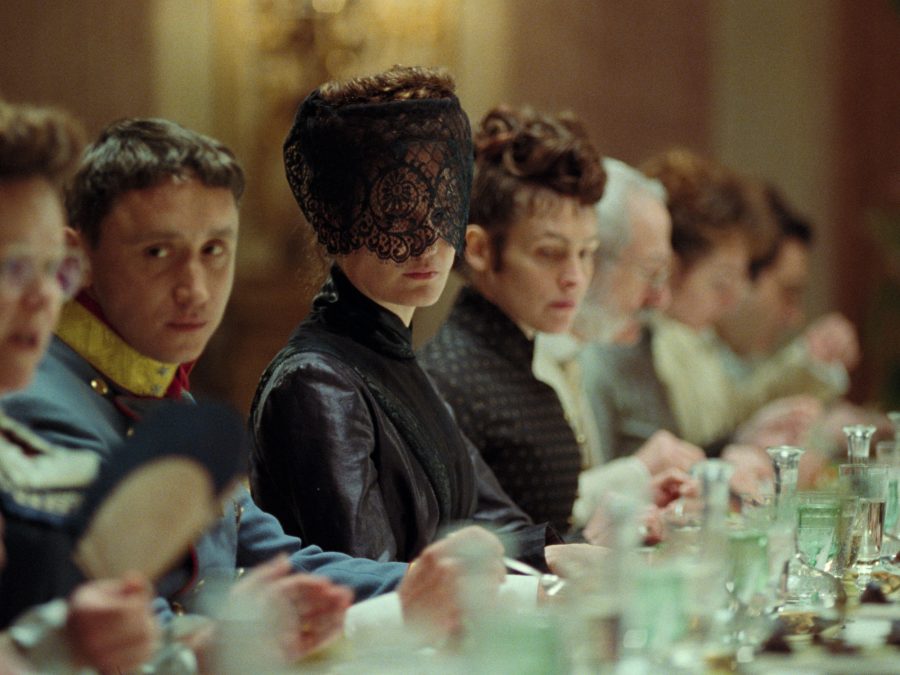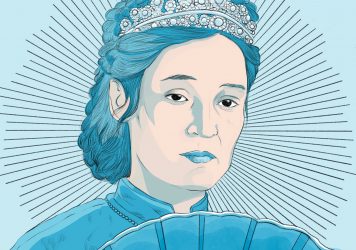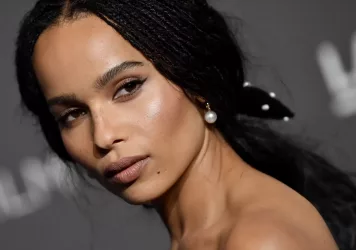
In a new series, we’re celebrating the films we loved that aren’t likely to dominate the awards race. Over the new few weeks, our writers make passionate arguments for the performances and craft that stood out to them, from blockbusters to arthouse and everything in between.
There is something beautifully ironic about Empress ‘Sissi’ Elisabeth of Austria’s (Vicky Krieps) refusal to wear makeup that has led Corsage to be the winner of this year’s Oscar for Best Makeup and Hairstyling in my heart. Marie Kreutzer’s film goes beyond the skin deep, exploring the dark corners of the Sissi’s golden cage through the animalistic styled wigs and radical makeup choices that bring the 19th-century trendsetter to life.
The power of hair and makeup was not always recognised in the film industry, and wasn’t introduced as an award until the 54th Oscars in 1982. Since then the category has been dominated by metamorphic films such as David Cronenberg’s The Fly and Tim Burton’s Beetlejuice before more recently championing biopics for their equally impressive and transformative looks. But hair and makeup designers Helene Lang and Maike Heinlein’s stripping back of the face and enlivening Sissi’s hair is a world away from what is normally praised, especially considering hairstyling was only officially introduced into the category in 2013.
First and foremost, Kreutzer’s film is about beauty – specifically the double edged sword of it – making it Sissi’s most powerful weapon while simultaneously suffocating her like the cigarette smoke she inhales in the film, and the corset that crushes into her ribcage. “Long may she live, beautiful may she remain,” is sung to Sissi on her 40th birthday. A proto-influencer, Sissi was idolised for her beauty and famous for inspiring hair trends. Her braids were her most precious and personal beauty feature and her hair stylists would spend up to three hours styling and a whole day washing.
Her rituals mirrored the sort of beauty that not everyone has the time or resources to achieve – think of a celebrity with spot-free skin, lash extensions, and micro-bladed brows, sharing a ‘makeup free selfie’. Sissi’s hair would take hours to delicately twist, braid, and pin up, but on her face – no makeup. Just a rigorous skincare routine consisting of olive oil baths and raw veal facial wraps which seemed to give her the privilege to poke fun at women who wore makeup to achieve the beauty standards the 19th century trendsetter dangled a pedestal above them.
Lang and Heinlein brought the vivid Sissi to life in a way that strays from her reality and previous reimagining of her on screen. Despite her unique privileges, Sissi was a prisoner of her own image and still suffered at the hands of the patriarchy. Her eating disorder, use of heroin and cocaine, and self-inflicted pain through use of corsets was a response to the beauty standards and expectations of women that were and still are upheld by archaic rules. While her wishes to immortalise her youth and beauty have been granted thanks to souvenir shops across Vienna, the wigs and stick on moustaches allowed Sissi a slither of the freedom she yearned for after her 40th birthday, as well as a rebellion from the expectations placed upon the empress.

In Ernst Mariscka’s ‘Sissi’ trilogy starring Romy Schneider, the actress fell victim to the constraints of women in film during the 1950s and despite the real Sissi’s dislike of wearing makeup, Schneider was heavily made up by makeup artist Fritz Jelinek, and the actress continued to be so in future films she starred in. But in Corsage, the whole crew agreed to free Sisi however possible. Echoing her suggestions made on Phantom Thread for the characterisation of Alma, Krieps encouraged no makeup. In terms of hair, flyaways were permitted and an uneven parting would be forgiven to portray an alternative and imperfect version of a princess. As a result, Krieps believes the stripping down of Sissi’s appearance was a liberating homage to Schneider.
Given the film’s title (which refers to the German for corset), much of the focus and reason for Sissi’s oppression and suffocation is credited to her restrictive bodices, but her hair is just as crushing, despite its feathering. Five different wigs were designed to recreate the aristocratic braided hairstyles trademarked by Sissi, and honoured the mid 19th century hair texture with sleek hair that exploded into individually curled ringlets. But it was twisted to mirror the disorder within Sissi’s mind.
The braids would literally tug at Sissi’s scalp, inflicting pain as much as the corset. In Corsage they are looser but still delicately styled to reinforce Kreutzer’s criticism of the harmful beauty standards that Sissi, and women to this day, are held to. Sissi’s hair is just as much of a character as the empress herself, serving as a bookmark for the stages of Sissi’s spiralling and liberation. As Sissi begins to rebel, the crown of braids placed on Krieps fall freely down her back – weighing the empress ever further down and into battle with herself before a haircut as monumental as Samson’s, but instead shifts the power into her own hands.
In Corsage, Sissi’s husband Franz Joseph, who is a 19th-century painting brought to life by actor Florian Teichtmeister sporting eccentric mutton chops, tells Sissi, “All you need to do is be appealing – that’s why I chose you, that’s why you’re here.” It seems like an outdated mindset, but Kreutzer blurs the line between history and the present with anachronisms to reinforce the point that women’s social limitations are just as prevalent today, because a woman’s value is still cemented in her level of beauty and hailed as her most important trait. “The only difference between then and now,” Kreutzer says in an interview, “is that people used to openly talk about it.”
Since the film’s release, Krieps has been outspoken about the toll embodying the empress took on her; it’s understandable why a line between the actress and character was blurred when the treatment of women isn’t so far different today – just subtler. But Corsage’s hair and makeup crew dared to fight against this, brandishing their brushes like middle fingers. By honouring Sissi’s and Krieps’ refusal of makeup when Schneider couldn’t, and untaming the empress’ braids, the subversive hair and makeup styling in Corsage, highlights why beauty is, in fact, beyond skin deep.
Published 18 Feb 2023

The star of Marie Kreutzer's Corsage reveals the demanding details of portraying an empress.

Fronted by Kerry Washington, Zoe Kravitz, and Rosario Dawson, the CROWN Act forbids discrimination against natural hair.